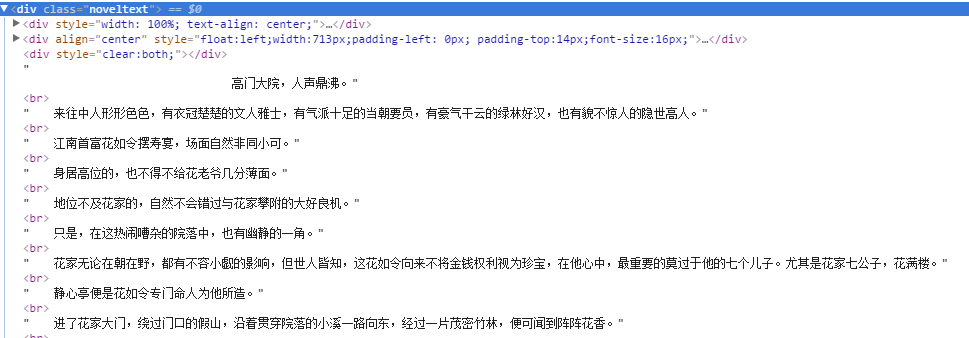1.在晋江文学网(http://www.jjwxc.net/)上选定一篇
不需要会员付费的小说(http://www.jjwxc.net/onebook.php?novelid=2443908);
2.在目录页获取各章节名称以及各章内容的url;
3.前往各章url获取文章内容,为了纯粹只获取内容,观察页面构局,使用正则表达式,筛选出需要的内容;
4.开始爬取,并将内容写入txt文件中,屏幕更新下载进度。
目录页结构:


内容页结构:


效果截图:


#-*- coding:gb2312 -*-
from bs4 import BeautifulSoup
import requests
import re
class downloader(object):
def __init__(self):
self.server='http://www.jjwxc.net/'
self.target='http://www.jjwxc.net/onebook.php?novelid=2443908'
self.names=[] #章节名
self.urls=[] #章节链接
self.nums=0 #章节数
def get_download_url(self):
req=requests.get(url=self.target)
req.encoding='gb2312' #显示指定网页编码
html=req.text
table_bf=BeautifulSoup(html,'lxml')
table=table_bf.find_all('table',class_='cytable')
tr_bf=BeautifulSoup(str(table[0]),'lxml')
a=tr_bf.find_all('a', itemprop='url')
self.nums=len(a) # 剔除不必要的章节,并统计章节数
for each in a:
self.names.append(each.string)
self.urls.append(each.get('href'))
def get_contents(self,target):
req=requests.get(url=target)
req.encoding='gb2312'
html=req.text
bf=BeautifulSoup(html,'lxml')
names=bf.find_all('div',style='float:left;width:713px;padding-left: 0px; padding-top:14px;font-size:16px;')
#print(names[0].string) #章节名
addcomments=bf.find_all('div',class_='readsmall') #避免最后有“作者有话要说”
contents=bf.find_all('div',class_='noveltext')
contentstr=str(contents[0])
if addcomments:
addcommentstr = str(addcomments[0])
contentstr=contentstr.replace(addcommentstr,'') #删去最后的附言
pattern=re.compile('.*?<br/>') #选出所有以<br/>为结尾的
conts=re.findall(pattern,contentstr)
#conts.insert(0,names[0].string) #添加章节名
conts[0]=conts[0].lstrip()
conts[0]=' '+conts[0] #第一行行首会有多余的空格
for i in range(len(conts)):
conts[i]=conts[i].replace('<br/>','') #去掉<br/>
return conts
def writer(self,name,path,text):
with open(path,'a',encoding='utf-8') as f:
f.write(name+'\n')
f.writelines(text)
f.write('\n\n')
if __name__=='__main__':
dl=downloader()
dl.get_download_url()
dl.get_contents(dl.urls[0])
print('开始下载!')
for i in range(dl.nums):
dl.writer(dl.names[i],'陆花1.txt',dl.get_contents(dl.urls[i]))
#stdout.write('已下载:%.3f%%' % float(i/dl.nums)+'\r')
#stdout.flush()
print('\r','已下载: %.3f%%' % float(i/dl.nums*100),end='',flush=True)
print('\r', '已下载: 100%',end='',flush=True)
print('\n下载完成!')